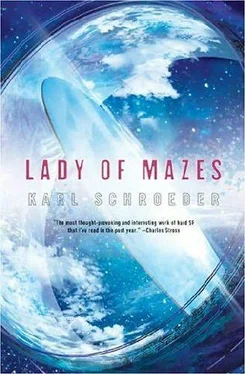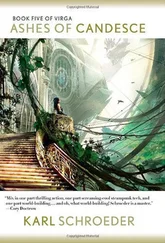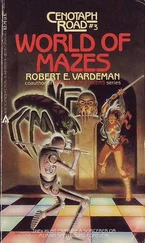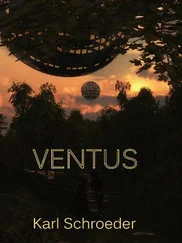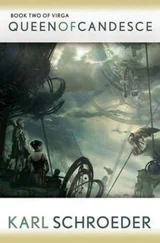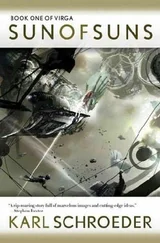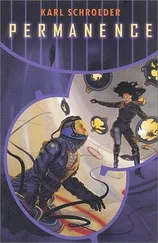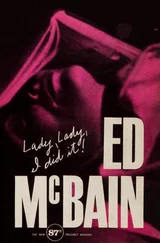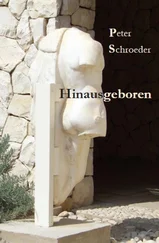"There were rumors at the time that a clean copy of the database was saved," said Peaseblossom. "By one of the main researchers. A woman named — "
"Ellis!" laughed Cicada. "Maren — "
" — Ellis." Peaseblossom glared at Cicada.
"And anyway," pouted Cicada, "everybody's coming down hard on the versos who are trying to build manifolds. They say that tech locks would be disastrous — "
"Who says so?" Qiingi stood up in sudden excitement "Do you know who it is that's so opposed to creating locks?"
Cicada shot him a reproachful look. "Well, I was just getting to that, wasn't I? It's certainly not the Government, though it doesn't approve, as it made abundantly clear to us the last time we spoke." He nudged Peaseblossom and rolled his eyes.
"There's all kinds of people against it," said Peaseblossom. "Lots of the votes — basically, churches and any social groups that are trying to expand. They've figured out that tech locks equal horizons, in the long run. And horizons would prevent them from expanding, see?"
"And don't even get me started about the Good Book people," scoffed Cicada.
His words somehow penetrated Livia's cocoon of misery. She looked up. "The Book isn't connected to any political movement," she said. "It's just an emergent system."
"Yeah, but what emerges?" asked Cicada. "Not just a Utopian human society, but all kinds of solitons and other high-level constructs that you can't see from the human level. The Book's an insanely complex system on the macro level. And that macro level sends orders back down to the bottom; it's a feedback loop, like your own brain." He pointed at her head.
"The thing is, the book relies on open communications," said Peaseblossom, "except that it needs to communicate through different channels than inscape. Any hint of a manifoldlike horizon would fragment it It would be the network equivalent of a stroke."
Livia barely heard him. Her head was still rattling with the idea that millions of people had ransacked her private records.
Cicada was saying, "You'd have to write a new version of the Book for every manifold, because technological differences change the way the roles interact. Not that people seem to mind doing rewrites. Apparently," Cicada leaned forward conspiratorially, "they've been adapting the Book to nonhuman species in the Archipelago. Trying to make the anecliptics obsolete by creating an emergent civilization that includes the post-humans."
To shut him up, Livia reached under the rock shelf that served as a bed, and brought out her copy of the Book. "Sophia said she was giving me the very latest version." She tossed it on the table and went back to fuming.
"Really?" Peaseblossom flipped through the Book. "Oh, yeah, the text is changing — I think it's trying to figure out what class of entity I am." He stuck out his tongue at the book and slammed it shut.
Livia took it from him, but didn't put it away. Instead, she flipped distractedly through it. She hadn't looked at it since their exile here; the rules of the Book were pretty irrelevant to a society of two.
"So there's lots of versions, are there?" she said indifferently.
"Yeah. It's easy to verify," said Cicada. "With printed books, they always put that information right in the front."
"Hmmph." None of it mattered; all this talk of politics was just a way to avoid the real question that was eating at her. She nervously flipped through the Book as she summoned her courage. Then she asked, "What about Aaron?"
Cicada and Peaseblossom glanced at one another. "I'm sorry," said Cicada. "We haven't been able to find a trace of him since the inscape virus."
"Ah." Blinking, she looked down, to find herself staring at the first page of the Book. She was too bereft to think, or to really take in the column of words there, the descriptions of where it was updated, according to what sims and when.
And then some lettering near the bottom leaped into focus: Revision No. 3340.
"There's been another breach, sir."
The words came through an old-fashioned speaking tube that ran up through the ceiling of the tunnel where Doran stood. He put it to his mouth and said, "Anybody we know?"
"It's Haver and her friend. They've got visitors."
"From the fleet?"
"Apparently not, sir."
Doran shrugged. "Then forget them. We've got more important things to worry about."
He'd opened an inscape window earlier today to watch a veritable cloud of ships that was approaching his Scotland. They were of all sizes and shapes — yachts, city-ships, shutdes, freight bots, and one-person sun-dancers. All were crowded with people who individually had no idea why they were here — except that the Book had told them to come. They'd all been given roles like Warrior and Scout. One man Doran had spoken to had excitedly explained how some sort of feedback loop had set in: he couldn't change his role anymore. Every other user of the Book this man met reinforced his role as Herald.
Collectively, they had decided that their new status had something to do with Doran Morss. Now their makeshift armada was preparing to besiege the worldship — and, co-incidentally or not, the Scotland's defensive systems were still off-line.
He paced down the stone steps that led deeper into the caves. This tunnel led to one of his clean rooms — an area of the worldship free of nosy anecliptic nano, and totally lacking inscape projectors. Officially, the place didn't exist. During the chaos of the past week Doran had felt himself under a microscope; even the annies might be watching after the fiasco with inscape. So for the past week, he had been unable to come down here and confirm with his own eyes what he already knew must have happened.
He rounded a corner and the great cavern opened out below him. This was a natural space, discovered in one of the asteroids he'd dismantled to build the Scotland. Do-ran had kept the cavern and shaved away the rest of the asteroid from around it. He liked the bizarre twisting shapes the stone made overhead; the overall impression of the place was forbidding. The last time he'd been here, brilliant spotlights had pinioned a strange object that nestled in the very center of the cavern. Now he let his breath out in a whoosh as he looked down on the empty cradle where the eschatus machine had sat.
As he'd thought. The attack on his inscape had been a cover operation. The real target was to steal the eschatus machine. With no working inscape, none of his ordinary servants could prevent the theft. The versos said they'd seen lights here that night, but what could they do? All they had was a few boats.
Doran clattered down the last few meters of catwalk and approached the empty metal cradle.
He should never have hesitated. He should have just stepped inside the machine and let the overhead cranes slam home the plug. Once the seams had grown together, the thing would have been ready. A single command from him and the process would start. The machine would drop out of the Scotland and once in free fall and well away from the worldship, it would explode. This particular machine peaked at fifty megatons.
If he'd done that, he would have transcended his human form instantaneously. The energy of the explosion wouldn't burst out randomly, it would be channeled, down to the microscopic level, into a creative reorganization of the machine's matter. Doran's body and brain would have become a template for a new, vastly more sophisticated and powerful entity. An equal to Choronzon. Eventually, perhaps, he might have become an equal to the annies themselves.
Faint sounds drifted down from the speaking tube. It sounded like someone was trying to get his attention. Do-ran hunched his shoulders, glaring at the empty cradle. Humanity needed a champion, it was as simple as that; and no merely human being could be that champion any more. The armies must be opposed. But despite decades of careful planning under total secrecy, somehow he'd been found out.
Читать дальше
